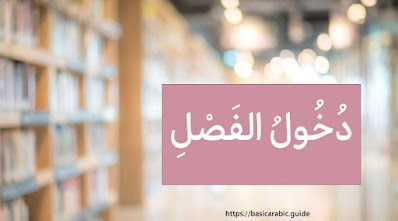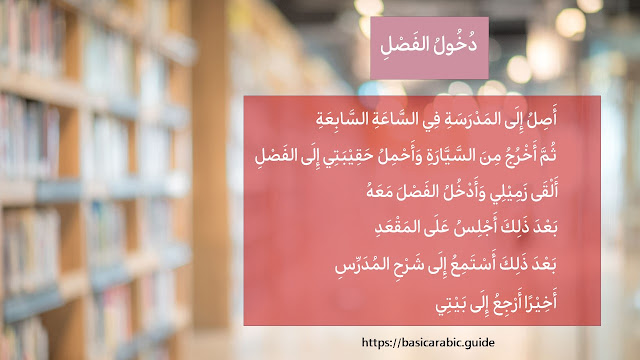Arabic Short Story : دُخُولُ الفَصْلِ
Let's study Arabic through reading short story and try to understand the words.
By reading the story, we can increase our Arabic vocabularies. I recommend you that you should practice the new word you get from this story. Practice them by trying to make new simple sentence with these words.
Ok, let's start reading. Observe the picture and read the story below.
The story
Below are English translation:
دُخُولُ الفَصْلِ
Entering the classroom
أَصِلُ إِلَى المَدْرَسَةِ فِي السَّاعَةِ السَّابِعَةِ
I arrived at the school at seven o'clock
ثُمَّ أَخْرُجُ مِنَ السَّيَّارَةِ وَأَحْمِلُ حَقِيْبَتِي إِلَى الفَصْلِ
Then I get out of the car and take my bag to the classrom
أَلْقَى زَمِيْلِي وَأَدْخُلُ الفَصْلَ مَعَهُ
I meet my friend and enter the classrom with him
بَعْدَ ذَلِكَ أَجْلِسُ عَلَى المَقْعَدِ
After that I sit on the seat
بَعْدَ ذَلِكَ أَسْتَمِعُ إِلَى شَرْحِ المُدَرِّسِ
After that I listen to teacher's explanation
أَخِيْرًا أَرْجِعُ إِلَى بَيْتِي
Finally, I return to my home
Word by word translation and the explanation
1. دُخُولُ الفَصْلِ
a. دُخُولٌ = entering
دُخُولٌ is masdar (مصدر) from دَخَلَ - يَدْخُلُ
دَخَلَ - يَدْخُلُ means enter
b. فَصْلٌ = class; classroom
Therefore دُخُولُ الفَصْلِ means entering the class.
- دُخُولُ is mudaf (مضاف)
- الفَصْلِ is mudaf ilaih (مضاف إليه), majrur (مجرور), the indication of it's jar is kasrah "i"
2. أَصِلُ إِلَى المَدْرَسَةِ فِي السَّاعَةِ السَّابِعَةِ
a. أَصِلُ = arrive
Root verb of أَصِلُ is => وَصَلَ - يَصِلُ
b. مَدْرَسَةٌ = school
إِلَى المَدْرَسَةِ
- إِلَى is harf jar (حرف الجرّ). It makes the noun after it is in majrur condition.
- المَدْرَسَةِ = majrur or genitive condition (مجرور) because it's preceded by harf jar إِلَى , the indication or sign of it's jar is kasrah "i"
c. السَّاعَةُ = clock
- السَّابِعَةُ = seventh
فِي السَّاعَةِ السَّابِعَةِ = at 7 o'clock
- فِي = harf jar (حرف الجرّ)
- السَّاعَةِ = majrur (مجرور) or genitive case because of har jar فِي, the indication of it's genitive is kasrah "i"
- السَّابِعَةِ = na't (نعت), it describe the word السَّاعَةِ , so it has the same case, genitive case. The sign of the genitive is kasrah "i"
So, أَصِلُ إِلَى المَدْرَسَةِ فِي السَّاعَةِ السَّابِعَةِ means => I arrive at the school at 7 o'clock
3. ثُمَّ أَخْرُجُ مِنَ السَّيَّارَةِ وَأَحْمِلُ حَقِيْبَتِي إِلَى الفَصْلِ
a. ثُمَّ = then; next; afterward
b. أَخْرُجُ = exit; go out
The root verb of أَخْرُجُ is خَرَجَ - يَخْرُجُ
c. سَيَّارَةٌ = car
مِنَ السَّيَّارَةِ
- مِنْ = harf jar
- السَّيَّارَةِ = majrur because of harf jar مِنْ , the indication of the jar is kasrah "i"
d. وَ = and
e. أَحْمِلُ = bring; take
The root verb of أَحْمِلُ is حَمَلَ - يَحْمِلُ
f. حَقِيْبَةٌ = bag
- حَقِيْبَتِي = my bag
g. إِلَى الفَصْلِ
- إِلَى = harf jar
- الفَصْلِ = majrur because of harf jar إِلَى , the sign of it's genitive is kasrah "i"
Therefore, ثُمَّ أَخْرُجُ مِنَ السَّيَّارَةِ وَأَحْمِلُ حَقِيْبَتِي إِلَى الفَصْلِ means : Then I get out of the car and take my bag to the class.
4. أَلْقَى زَمِيْلِي وَأَدْخُلُ الفَصْلَ مَعَهُ
a. أَلْقَى = meet
The root verb of أَلْقَى is لَقِيَ - يَلْقَى
b. زَمِيْلٌ = friend
زَمِيْلِي = my friend
c. أَدْخُلُ = enter
The root verb of أَدْخُلُ is دَخَلَ - يَدْخُلُ
d. أَدْخُلُ الفَصْلَ
- أَدْخُلُ = fi'il mudari (فعل مضارع) with the subject أَنَا (I)
- الفَصْلَ = maf'ul bih (مفعول به) or object from the fi'il أَدْخُلُ , mansub (منصوب) or accusative case, the indication of the accusative is fathah "a"
أَدْخُلُ الفَصْلَ = enter the class
e. مَعَ = with
مَعَهُ = with him
So, أَلْقَى زَمِيْلِي وَأَدْخُلُ الفَصْلَ مَعَهُ means I meet my friend and I enter the class with him.
5. بَعْدَ ذَلِكَ أَجْلِسُ عَلَى المَقْعَدِ
a. بَعْدَ ذَلِكَ = then; after that
b. أَجْلِسُ = sit
the root verb of أَجْلِسُ is جَلَسَ - يَجْلِسُ
c. المَقْعَدُ = seat; chair
عَلَى المَقْعَدِ = on the chair
- عَلَى = harf jar
- المَقْعَدِ = majrur because of har jar عَلَى , the indication of it's jar is kasrah "i"
So, بَعْدَ ذَلِكَ أَجْلِسُ عَلَى المَقْعَدِ means Then I sit on the chair.
6. بَعْدَ ذَلِكَ أَسْتَمِعُ إِلَى شَرْحِ المُدَرِّسِ
a. أَسْتَمِعُ = hear; listen
The root verb of أَسْتَمِعُ is اِسْتَمَعَ - يَسْتَمِعُ
أَسْتَمِعُ إِلَى = listen to; pay attention to
b. شَرْحٌ = explanation
إِلَى شَرْحِ
- إِلَى = harf jar
- شَرْحِ = ism majrur, majrur by harf jar إِلَى , the sign of it's jar is kasrah "i"
It also acts as mudaf.
- المُدَرِّسِ = mudaf ilaih (from شَرْحِ ), majrur, the indication of it's jar is kasrah "i"
7. أَخِيْرًا أَرْجِعُ إِلَى بَيْتِي
a. أَخِيْرًا = finally
b. أَرْجِعُ = return; go back
The root verb of أَرْجِعُ is رَجَعَ - يَرْجِعُ
c. بَيْتٌ = house; home
بَيْتِي = my house
So, أَخِيْرًا أَرْجِعُ إِلَى بَيْتِي means Finally I return to my home.



No comments:
Post a Comment